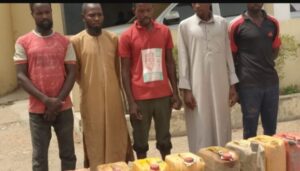No matter how you may have looked at it, there was nothing progressive about the official response of Lagos State Government to the EndSARS saga as far as the Lekki Tollgate bloodletting was concern. And, disturbingly, a smooth return to normal life is difficult without a universal COVID-19 jabs.
President of the UN General Assembly on Tuesday announced a New Year resolution on vaccine equity, calling on governments to come together on this issue ahead of a major event in mid-January.
Before we return to this virus wahala, Policy and Legal Advocacy Centre (PLAC) says the report of the EndSARS panel on Police brutality was damning enough. The Lagos State Judicial Panel of Enquiry received reports of massive abuse of citizens’ rights by the Police and security forces, and described killings at the Lekki Tollgate last October 20, as a massacre.
The panel’s report which was leaked, also accused the Army and the Police of killing peaceful protesters and taking action to clean up evidence. Receiving the report of the panel on November 15, 2021, the Lagos State government promised to issue a White Paper within two weeks. Keeping to its words, it did. A White Paper was issued on the report of the panel.
The state government’s White Paper appear however, to differ radically from the contents of the report. The serious, egregious violation of rights identified in the report was whitewashed by the government’s White Paper. Indeed, it appears that the government White Paper came out smelling like sweet rose. To drive the knife deeper into the wound, the Lagos State government announced invitation to EndSARS protest leaders to come for a “Peace Walk.”
Just after the EndSARS panel report was leaked, one of the protesters was attacked, while one of the panel members reported threat to his life. According to Ebun-Olu Adegboruwa (SAN), he received threats to his person, which made him worry about his safety.
In a public statement, Adegboruwa stated that there have been lots of threats and attacks by those suspected to be agents of the government, against him, especially in the media. He called on citizens to hold government responsible should anything happen to him.
In an earlier development, one of the prominent EndSARS protesters who testified before the panel, Miss Kamsiyochukwu Ibeh was attacked and dealt serious machete blows by those her lawyers described as government agents.
Nigerians and lots of Nigeria’s watchers have raised serious questions about the antics and tactics of Police and security forces in their management of public protests, and treatment of government critics. In widely reported cases, the high-handedness of security forces and the police have been manifestly brutal.
In the reported case of the attempted arrest of Oduduwa Republic activist, Sunday Igboho, security forces had invaded his home and shown gross disregard for human rights by the manner in which the invasion occurred.
There were reports of killings and blood spilling during Igboho’s home invasion. Equally, there is this invasion of the home of the Islamic leader, Ibrahim El-Zakzaky, where hundreds of members of his sect were killed and razing it by security forces.
“Unless we can vaccinate the world, there is no way out of this. You see different types of variants coming out, and this is going to continue,” Abdulla Shahid told journalists in New York.
He said he would convene a high-level event in the General Assembly on 13 January with the goal of ensuring equitable access and delivery of vaccines “to everyone, everywhere, at the earliest.”
Leading up to the event, member states will be able to register their support for universal COVID vaccinations in what Shahid is calling a New Year’s resolution.
“I want to see renewed political commitment and meaningful engagement to ensure universal vaccination,” he told correspondents.
Shahid noted that the international community had missed the target set by the World Health Organisation (WHO) to inoculate 40 per cent of the world’s population by the end of this year, and that there are concerns about meeting the next target of 70 per cent by the middle of 2022.
“We do not have vaccine equity,” he said. “when you look at countries in Africa where you have an average vaccination rate of maximum, 5 or 6 per cent. We are unable to say with confidence that we are anywhere near to equity.”
He noted that this is exactly why the General Assembly must unite on vaccinations.
“The new normal will be pushed again further and further” into unknown territory he said. “This we cannot afford, and that is why we need to get together for the effort, a united effort.”
In his press conference, he also spoke about responding to the needs of a warming planet, human rights, and revitalizing the work of the United Nations.
He also stressed the importance of involving young people in the UN’s work, in particular through his Fellowship of HOPE, which will bring eight young diplomats from underrepresented countries to the President’s Office starting in January.
“As a small islander who has seen and experienced the struggles of so many countries in keeping up with the rest of the world on the diplomatic stage, I know they will walk away with knowledge and skills to support their nations,” Shahid said. “As true multilateralists.”







